SEO Lessons Ecommerce Newbies Should Never Ignore. Ever!

1. Target the right keywords.
Several seasoned ecommerce entrepreneurs and marketers subscribe to the idea that targeting the right keywords is crucial to the success of your business. Whether you’re attempting to come up with compelling content topics that can influence your readers to take action on your offers, or you’re looking to optimize your website for the search engines, you’re going to need the right set of keywords to pull those off. Allow me to share with you two crucial bits of information that can help you mine the right keywords:a. Use a reliable keyword research tool.
Keyword research tools are important since they give you important insights about your prospective keywords, Let’s check out SEMRush, for example. If you type in the keyword phrase “MacBook air,” the tool will come up with these results.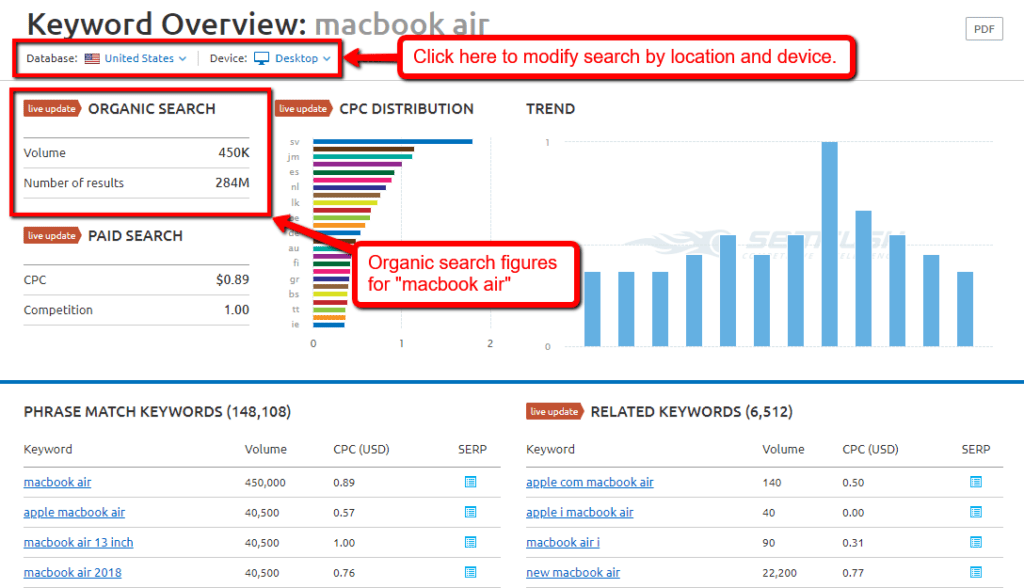 You can view the keyword’s organic and paid searches, and also its trend. You can even modify your keyword research by device and location.
When you scroll down, Semrush also shows keyword phrases, sites that topped the organic searches, sites with their narrative and visual product ad copies, and ads history.
You can obtain more data about the keywords by clicking the Keyword Magic Tool on the left side of the dashboard. The page will look like this:
You can view the keyword’s organic and paid searches, and also its trend. You can even modify your keyword research by device and location.
When you scroll down, Semrush also shows keyword phrases, sites that topped the organic searches, sites with their narrative and visual product ad copies, and ads history.
You can obtain more data about the keywords by clicking the Keyword Magic Tool on the left side of the dashboard. The page will look like this:
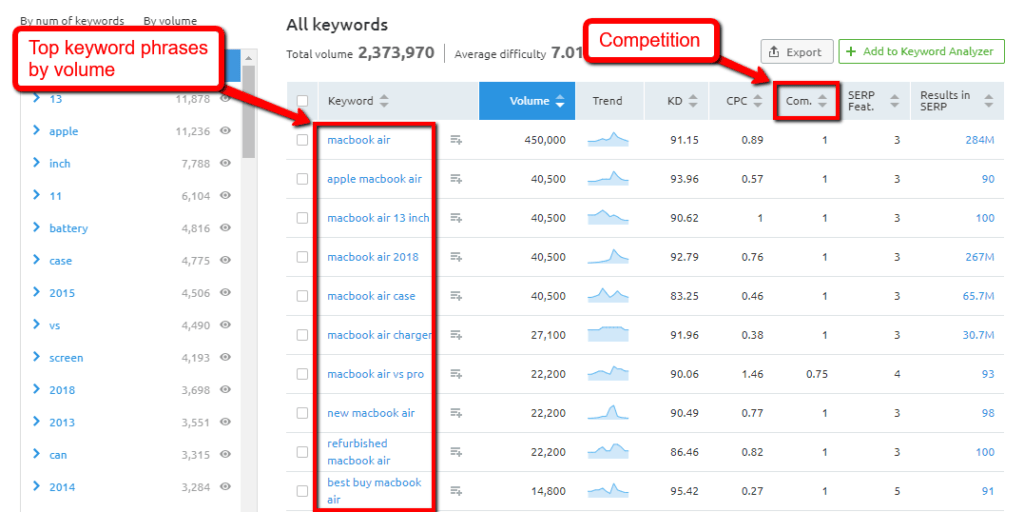 There you will find the top keywords according to their search volume (over 12 months) and figures pertaining to the level of competition.
You will also find figures for other metrics such as trend, cost-per-click (CPC), and results in organic engine searches.
From this data, you can garner rich insights to help you decide on which keywords you’ll target. Ideally, you should aim for those that yield low competition but have a high search volume.
b. Search in online forums.
One of the SEO basics that small business owners should know is online communities and question-and-answer forums are a great place to mine for keywords.
Check out Reddit, for example.
There you will find the top keywords according to their search volume (over 12 months) and figures pertaining to the level of competition.
You will also find figures for other metrics such as trend, cost-per-click (CPC), and results in organic engine searches.
From this data, you can garner rich insights to help you decide on which keywords you’ll target. Ideally, you should aim for those that yield low competition but have a high search volume.
b. Search in online forums.
One of the SEO basics that small business owners should know is online communities and question-and-answer forums are a great place to mine for keywords.
Check out Reddit, for example.
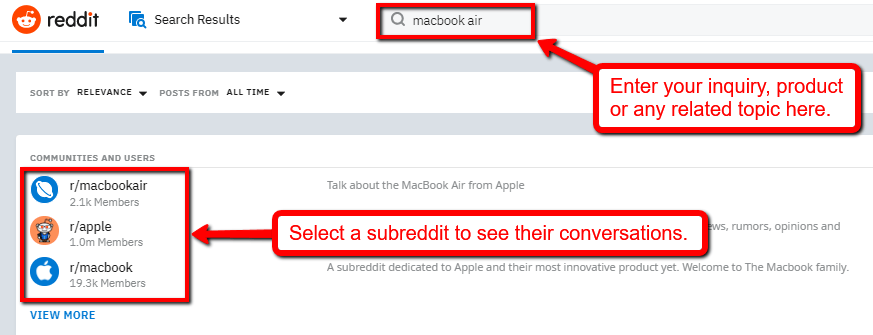 Enter your industry, product, or any other topic in the search box on their homepage.
Then click on a group (called a subreddit) to view the conversations and inquiries there.
For instance, I clicked on “r/MacBookair,” Here are some of the posts:
Enter your industry, product, or any other topic in the search box on their homepage.
Then click on a group (called a subreddit) to view the conversations and inquiries there.
For instance, I clicked on “r/MacBookair,” Here are some of the posts:
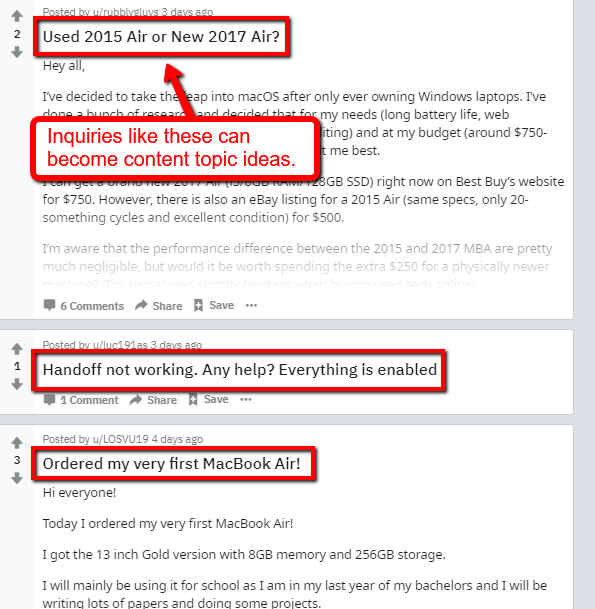 The posts range from the users sharing their first use or purchase of a Macbook Air, inquiries on how to fix physical damages, compatibility issues, and more.
These inquiries and posts can help you uncover content ideas to write about. And because these ideas are validated by the number of engagement it garnered from the forum, you can ascertain (to some extent), that your audience is going to like reading about them.
Quick Tip: You can write about the same topic of the most liked post or those with the most replies.
The posts range from the users sharing their first use or purchase of a Macbook Air, inquiries on how to fix physical damages, compatibility issues, and more.
These inquiries and posts can help you uncover content ideas to write about. And because these ideas are validated by the number of engagement it garnered from the forum, you can ascertain (to some extent), that your audience is going to like reading about them.
Quick Tip: You can write about the same topic of the most liked post or those with the most replies.
2. Publish valuable and compelling content.
Content may be “king,” but it’s worth remembering that not all content is created equal. The content you produce needs to be valuable and relevant to your audience; otherwise, they won’t take action on your offers, especially with how fierce the competition has become online. That’s why the topics and keywords you uncovered in your research is vital. If they are relevant to your audience at the onset, you can produce valuable content based on those keywords. Your content should also compel your audience to respond to your call to action. In this way, you can increase your conversions. If you are insanely busy and you need help with getting your content written, you can find seasoned writers who can help you with your content. When looking for a freelance writer, consider those who have not only writing prowess, but also those with content marketing know-how. Freelancemyway is a good place to find writers who are specifically in content marketing. On their homepage, type in “content writer” in the search box. Among the results shown, you will find writers who aren’t just writers, but those with content marketing experience.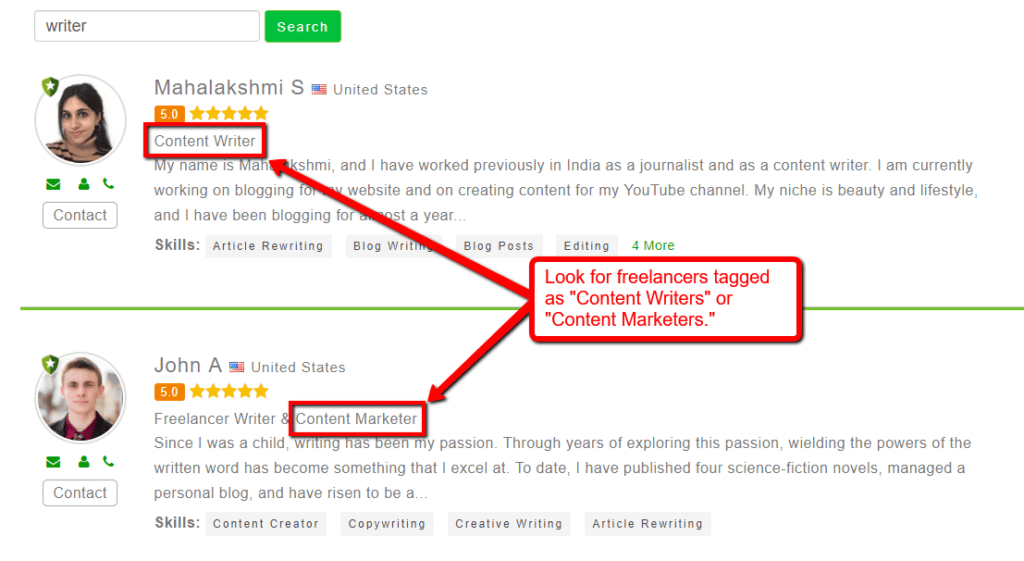 Writers adept in content marketing know-how to deliver a message that helps drive traffic to your website, sell your products, or achieve your other marketing goals.
They can also sprinkle your content with your target keywords and psychological triggers that will help convert your prospects into customers.
If you want to take a more in-depth approach to ensure the content you’ve been producing is optimized for SEO, you can also have the freelancer do a website content audit.
Doing so helps you gain a full understanding of how much content you have, where they live, how they are written, how they are organized, and how your audience engages with them.
Writers adept in content marketing know-how to deliver a message that helps drive traffic to your website, sell your products, or achieve your other marketing goals.
They can also sprinkle your content with your target keywords and psychological triggers that will help convert your prospects into customers.
If you want to take a more in-depth approach to ensure the content you’ve been producing is optimized for SEO, you can also have the freelancer do a website content audit.
Doing so helps you gain a full understanding of how much content you have, where they live, how they are written, how they are organized, and how your audience engages with them.
What SEO strategies should B2B and B2C ecommerce businesses employ to improve their online presence?
Understanding the differences between B2B and B2C ecommerce is vital for ecommerce businesses as they create SEO strategies designed to enhance their digital footprint. B2B organizations must focus on optimizing their website with preferred keywords that appeal to their target audience, while B2C vendors ought to emphasize user interaction and mobile accessibility. Yet, placing utmost importance on high-quality content, backlinks, and involvement in social media is equally important for both types of businesses to achieve better SEO outcomes.
3. Create attractive visuals.
Producing and integrating attractive visuals is crucial for your SEO content. Visuals capture your readers’ attention better than text alone does. However, when choosing visuals, you need to make sure that your images aren’t just high-quality and beautifully designed — they also need to be relevant. This principle applies to your logo as well — even more critically since they bear your company’s image. When they click on your link and visit your website to read the content, your audience sees your logo and may even pre-judge your level of authority based on its design. As such, you’d be better off working with tried and tested — let alone, reliable — graphic designers and clipping path service providers so you can come up with professional-looking visual designs. For your content visuals, instead of using stock photos, consider designing your own images. Doing so will make your content look original, connected, and authoritative. With the many graphic designing tools available online, it’s now easy for you to produce professional-looking images for your content. One tool you can use is Snappa.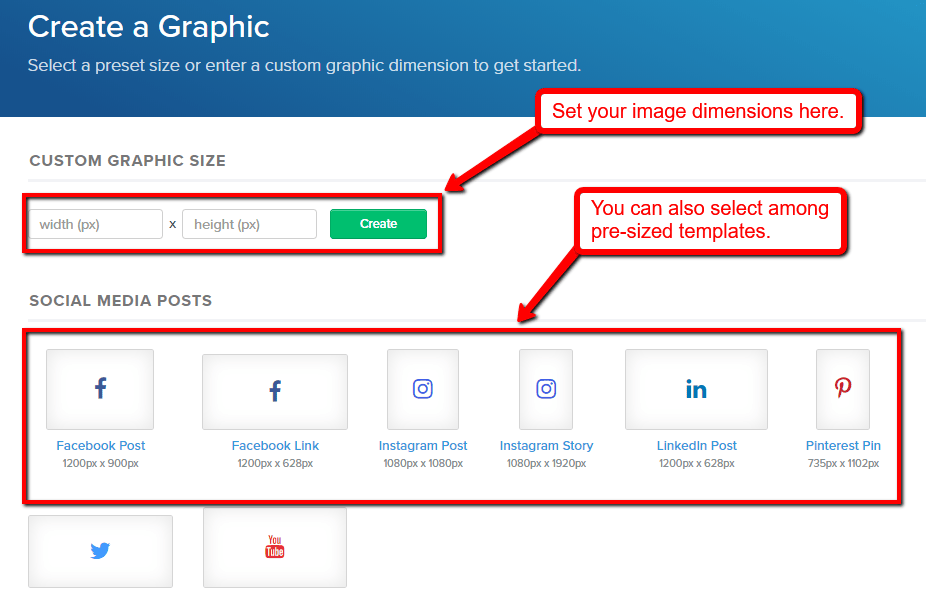 The tool allows you to set the dimensions of your images first, or select among pre-made templates in their recommended sizes.
These templates can be for your website content or social media.
After sizing your digital canvas, you can start designing. You can do so from scratch or modify a pre-designed template.
The tool allows you to set the dimensions of your images first, or select among pre-made templates in their recommended sizes.
These templates can be for your website content or social media.
After sizing your digital canvas, you can start designing. You can do so from scratch or modify a pre-designed template.
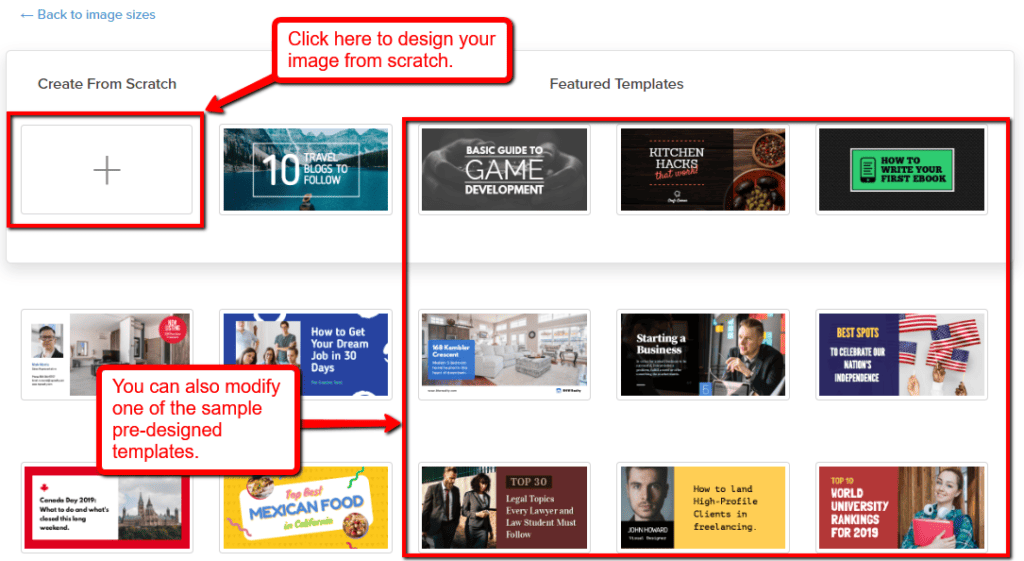 Whichever option you select, you can then adjust the text, font style and size, background, and other elements, as you can see below:
Whichever option you select, you can then adjust the text, font style and size, background, and other elements, as you can see below:
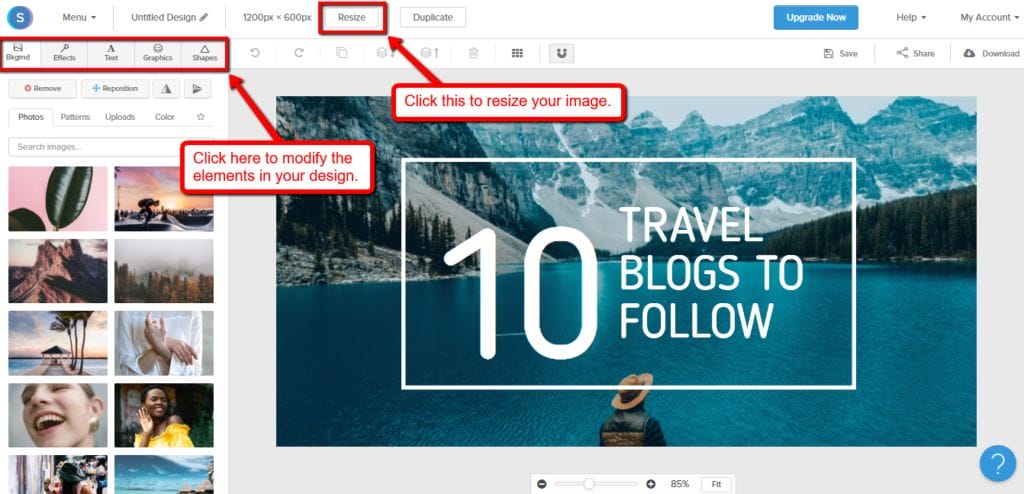 Once you finish your design, you can opt to save it on your Snappa portfolio or download it to your device.
Once you finish your design, you can opt to save it on your Snappa portfolio or download it to your device.
4. Increase your page’s load speed.
Page speed is a critical factor for your ecommerce business. Statistics show that your visitors are likely to leave your site if it doesn’t load within three seconds. Google announced that page speed for desktop and mobile searches are crucial factors in how they rank pages in their search results. Ranking in the SERPs means you get more chances of driving traffic into your site, as well as conversions and sales. That being said, if you want to rank high, you have to increase your page speed. If you’re not sure how fast your website loads, you can measure your speed with a tool like GTMetrix. To show you how GTMetrix works, I used “godaddy.com” as an example. Here are the results: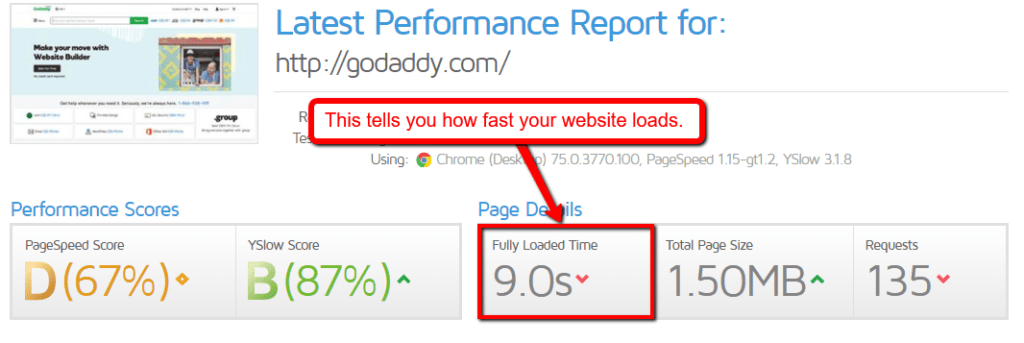 GTMetrix tells you how fast your loading time is, along with the size of your page and their rating for it.
When you scroll down, you can find their recommended actions that you can take to improve your page speed.
GTMetrix tells you how fast your loading time is, along with the size of your page and their rating for it.
When you scroll down, you can find their recommended actions that you can take to improve your page speed.
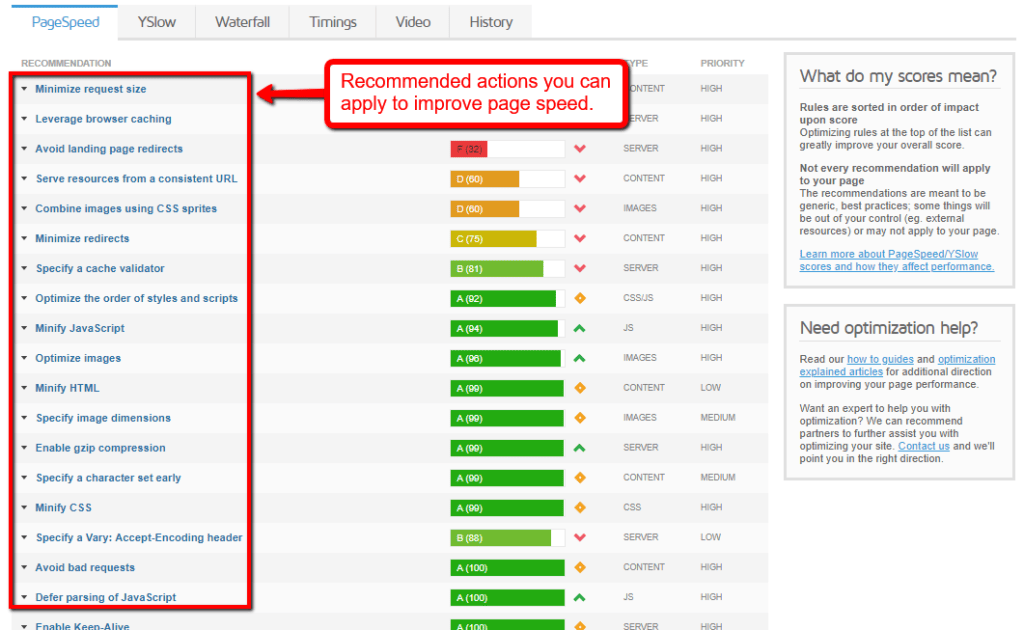 With the right tools to optimize your website load speed, you can lower your bounce rate and increase the chances of ranking higher in SERPs — which can help boost your conversions and sales.
With the right tools to optimize your website load speed, you can lower your bounce rate and increase the chances of ranking higher in SERPs — which can help boost your conversions and sales.





